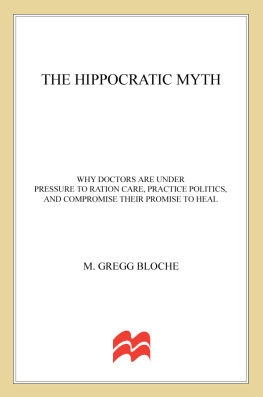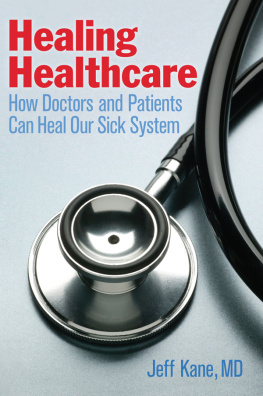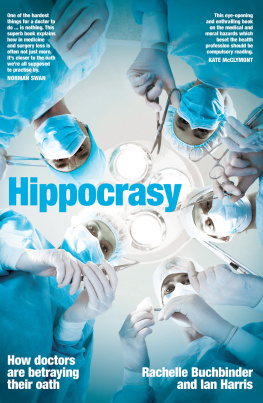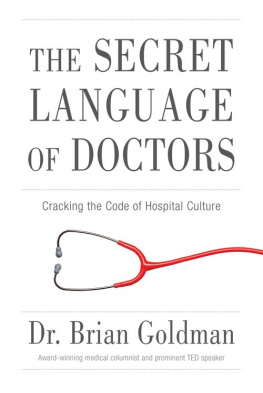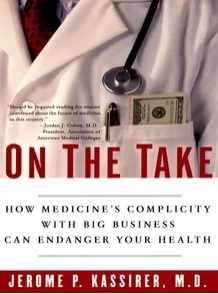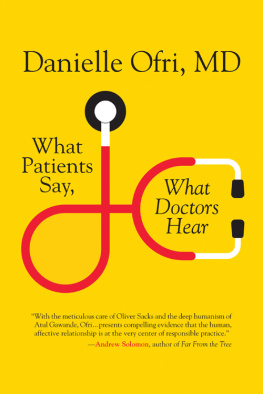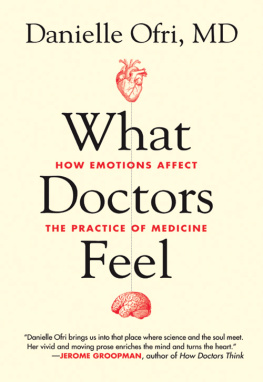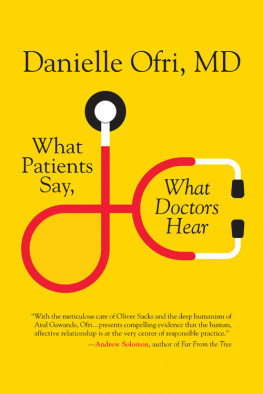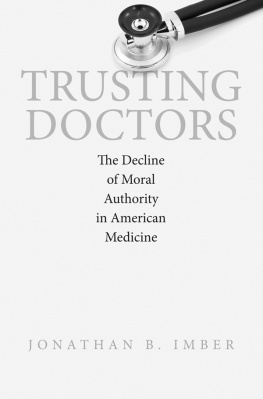the hippocratic myth
WHY DOCTORS ARE UN DER PRESSURE TO
RATION CARE, PRACTICE POLITICS, AND
COMPROMISE THEIR PROMISE TO HEAL
M. GREGG BLOCHE, M.D.

The author and publisher have provided this e-book to you for your personal use only. You may not make this e-book publicly available in any way. Copyright infringement is against the law. If you believe the copy of this e-book you are reading infringes on the authors copyright, please notify the publisher at: us.macmillanusa.com/piracy.
THE HIPPOCRATIC MYTH
Copyright M. Gregg Bloche, 2011.
All rights reserved.
For information, address St. Martins Press, 175 Fifth Avenue, New York, N.Y. 10010.
First published in 2011 by PALGRAVE MACMILLAN in the United States a division of St. Martins Press LLC, 175 Fifth Avenue, New York, NY 10010.
ISBN 978-0-230-60373-8
Our eBooks may be purchased in bulk for promotional, educational, or business use. Please contact the Macmillan Corporate and Premium Sales Department at 1-800-221-7945, ext. 5442, or by e-mail at .
Library of Congress Cataloging-in-Publication Data
Bloche, Maxwell Gregg, author.
The hippocratic myth : why doctors are under pressure to ration care, practice politics, and compromise their promise to heal / Gregg Bloche, M.D., J.D.
p. ; cm.
Includes index.
ISBN 9780230603738 (hardback)
1. Medical careUnited States. 2. Medical ethics. 3. Health care rationingUnited States. 4. PhysiciansUnited States. I. Title.
[DNLM: 1. Hippocratic OathUnited States. 2. Health Care CostsUnited States. 3. Health Care RationingethicsUnited States. 4. Physicians RoleUnited States. 5. Physician-Patient Relations United States. 6. Quality of Health CareethicsUnited States. W 50] RA395.A3B5445 2011
362.1042dc22
2010044392
A catalogue record of the book is available from the British Library.
Design by Letra Libre, Inc.
First edition: March 2011
10 9 8 7 6 5 4 3 2 1
Printed in the United States of America.
To the Memory of
Ruth and Jere Bloche
acknowledgments
This book addresses a subject that has remained, for the most part, unspeakable in our civic life. Medicine serves many social purposes that are sharply at odds with doctors Hippocratic commitment to patientsand with our expectations as citizens and consumers. Doctors control costs by forgoing beneficial care. Theyll do so increasingly as health spending soars and cost pressures mount. Clinical judgment incorporates cultural and moral norms, including some that are bitterly contested. And doctors put their skills and know-how to use on behalf of national security and criminal and civil justice, at times doing great harm to individuals.
We ask doctors to do these things and then become angry when we discover that theyve broken with Hippocratic expectations. Understandably, doctors dont like to talk about this. Neither do public officials, policy wonks, nor ethicists: Navigating contradiction among peoples desires is a treacherous endeavor. To explore this realm, I tap the experience of those whove dwelt within it: doctors and patients whove found themselves caught between our incompatible expectations, as well as policy makers whove called on health professionals to compromise Hippocratic ideals. Im deeply grateful to those whove shared their experiences with me for this book. Many have done so on condition of anonymity, out of concern for legal or other repercussions. Ive kept the use of anonymous sources to a minimum, but, at times, Ive found it essential to shine a light on issues and events that would otherwise remain unseen.
This book is a genre hybrida blend of narrative, investigative reporting, and scholarship. Its thus outside the box of what law professors usually write, and I thank my Deans at the Georgetown University Law Center (Alex Aleinikoff, Judy Areen, and Bill Treanor) for backing this project. My work on it would not have been possible without summer writing grants from Georgetown. Im also grateful to the John Simon Guggenheim Foundation for awarding me a Fellowship for this projectand to Henry Aaron at the Brookings Institution and Dan Wikler at the Harvard Program on Ethics & Health for believing in this project and for hosting me during my Guggenheim semester. Im indebted, as well, to Belle Sawhill in the Division of Economic Studies at Brookings for additional support during my time as a non-resident senior fellow. And I thank the University of Chicago and UCLA law schools for their research support during my visiting appointments there.
During a lunch gathering at a tony law school a few years back, a group of professors argued over whether evocative writing, writing that told stories and stirred feelings, should be viewed neutrally or counted against candidates for tenure. Their shared premise seemed to be that readers emotions cloud analytic rigoror lack thereof. Its for others, not me, to decide whether the writing in this book evokes feeling (and does so fairly). But Im grateful to two Georgetown colleagues, Robin West and Steve Goldberg (whose premature passing stole from our midst a sage and cherished counselor) for encouraging me in my belief that feeling is vital to knowing and communicating about matters that stir hope and fear. They encouraged me to take on this project and to stick to it. So did my good friend Elyn Sakslegal scholar, memoirist, and MacArthur Fellow whose courageous account of her struggle with schizophrenia did much to educate Americans about this illness.
For their comments and suggestions, Im indebted to participants in workshops and conferences at the Brookings Institution, Georgetown University Law Center, Harvards Law School and School of Public Health, Loyola University Law School, Stanford University Law School, Tsinghua University School of Public Policy & Management, the University of California at Davis Medical and Law Schools, University of Capetown Medical School, UCLA Law School, University of Chicago Law School, University of Illinois Law School, University of Minnesota Law School, University of Pittsburgh Law School, University of Toronto Law School, University of Virginia Medical School, and Wake Forest University Law School, at which I presented ideas and drafts that coalesced into this book. Im especially grateful to Henry Aaron, Martha Blaxall, Allan Brandt, James Childress, Einer Elhauge, Richard Epstein, Ruth Faden, Judy Feder, Jacqueline Fox, Robin Hacke, Mark Hall, Dan Halperin, Peter Hammer, Claire Hill, David Hyman, Peter Jacobson, Emma Jordan, Allan Leshner, Jonathan Marks, Joan Meier, Thomas Naughton, Martha Nussbaum, David Orentlicher, Diane Orentlicher, Robert Pear, Lynne Randolph, David Richardson, William Sage, Sally Satel, Belle Sawhill, Carl Schneider, Michael Seidman, Alan Stone, Geoffrey Stone, Eric Stover, Sean Tunis, Greta Uehling, Ellen Waldman, Robin West, Dan Wikler, Susan Wolff, and Matthew Wynia for their guidance and feedback at various stages of this project.
I thank my research assistants, who played critical roles at all stages. At Georgetown, Anna Gorisch, Suji Jhaveri, Una Lee, Dan Lerman, and Devan Musser gathered and organized information on medicines many social roles. At the University of Chicago, Shira Kelber and Rachel Beattie did similarly invaluable research. This project also benefited greatly from research support provided by Georgetowns ONeill Institute for Health Law. Im grateful to ONeill Fellows Oscar Cabrera, Rebecca Haffajee, Katrina Pagonis, and Karen Sokoland to ONeill research assistants Toyin Akintola, Daniel Armstrong, Meredith Eckstut, Torrey Kauffman, Victoria Ochanda, Neil Rao, and Alia Udhiri.
Special thanks are due to Luba Ostashevsky, my editor at Palgrave Macmillan, for her enthusiasm about this book, her support when my confidence flagged, her deft touch with prose that dipped too deeply into the wonkish weeds, and her tolerance for my too-long delays. Im also indebted to my agents, Todd Shuster and Eve Bridberg, for believing in this project. I thank Lydia Mc-Daniel for secretarial support and Dianne Harrison Ferro Mesarch for her wizardry with Word, Acrobat, and a miscreant laptop. And there arent words to convey my appreciation for the Georgetown law librarys terrific reference staff, who tracked down hundreds of obscure sources, at times with minimal notice.

